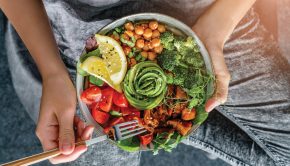Food & Mood
Solutions for Emotional Eating
A stressful day might have us seeking solace in ice cream, pizza or potato chips. Other times, we may feel a second donut or another high-calorie treat is our reward for a task well done. Occasional food indulgences are one of life’s pleasures, but habitually eating in response to our emotions can cause weight gain and health problems.
Core Issues
“Emotional hunger represents an appetite, craving or desire to eat in the absence of true physiological hunger cues,” explains Julie Simon, author of The Emotional Eater’s Repair Manual: A Practical Mind-Body-Spirit Guide for Putting an End to Overeating and Dieting. “Emotional hunger often feels the same as physical hunger,” she adds, yet it might represent an unconscious longing for pleasure, calm, comfort, excitement or distraction.
It can also have a physiological basis. A 2011 study from the University of Leuven, in Belgium, shows that stomach-based hormones can connect directly to the brain, setting up cravings for sugary and fatty foods, suggesting that we are hardwired to want the foods that provide the greatest number of calories in the smallest quantities.
Sugary, starchy, salty and fatty foods also push the brain’s “reward” button, prompting the production of more dopamine, the neurotransmitter of pleasure and well-being. Dr. Pam Peeke, Ph.D., author of The Hunger Fix: The Three-Stage Detox and Recovery Plan for Overeating and Food Addiction, maintains that these foods also create a difficult-to-break addiction cycle. According to Peeke, an assistant clinical professor at the University of Maryland School of Medicine, in Baltimore, the more high-calorie foods we eat, the more we need the “high” they produce. Soon, increased amounts of foods like cheeseburgers, potato chips or chocolate chip cookies are necessary to help us feel good again.
Handling emotions without turning to food can be a knotty problem, health professionals agree, involving interweaving physical, emotional and spiritual strands.
Physical Signals
One solution is to simply pay attention to what our body is saying. Are we truly feeling hunger pangs? “When we eat in the absence of hunger cues, regularly choose unhealthy comfort foods or continue eating when we’re already full, something is out of balance,” observes Simon at OvereatingRecovery.com.
Identifying “trigger” foods might also enlighten us, advises Peeke. “You’re out of control if you have a particular food in your hand and you can’t just enjoy it, walk away and say, ‘Ahh, that was wonderful.’ Life’s okay without that particular food.” The key is being smart about which foods we need to eliminate and which ones will help us feel good and enjoy an overall better quality of life.
“When you follow a plant-based, unprocessed, whole foods eating plan, your body chemistry becomes balanced and your biochemical signals (hunger, cravings and fullness) work well,” explains Simon. “Each time you eat, you feel satisfied and balanced, physically and emotionally.”
Emotional Underpinnings
Once we understand the physical component of emotional hunger, we can address the feelings that cause it. Most famous for their Rescue Remedy herbal and floral drops that help soothe anxiety, Bach Flower Essences recently created an Emotional Eating Support Kit that includes homeopathic essences of crabapple, cherry plum and chestnut bud. They maintain that four daily doses can help us think clearly and calmly when we fear losing control, plus objectively observe mistakes and learn from them.
Some feelings, however, can’t be “gentled” away. “Soothe the small stuff, grieve the big stuff,” Simon advises. Experiencing abandonment, betrayal, domination or violation may require therapy. Lesser stressors can often be soothed by music, being outdoors, talking to a friend, taking a warm bath, walking, meditative yoga or pausing to pray—instead of eating.
“No matter how sophisticated or wise or enlightened you believe you are, how you eat tells all,” maintains Geneen Roth, author of Women, Food, and God: An Unexpected Path to Almost Everything. “Your world is on your plate.” Roth came to terms with her own food addictions and now leads retreats to help others do the same.
When we begin to understand what prompts us to use food to numb or distract ourselves, the process takes us deeper into realms of spirit and to the bright center of our lives, says Roth. She urges us to be present in the moment and to use good food as a sort of meditation. Notice the beautiful greens in the salad and bless the farmer that grew them. It’s one path to realizing the essence of food that’s good for us is a blessing we deserve.
Award-winning cookbook author Judith Fertig blogs at AlfrescoFoodAndLifestyle.blogspot.com.
<












